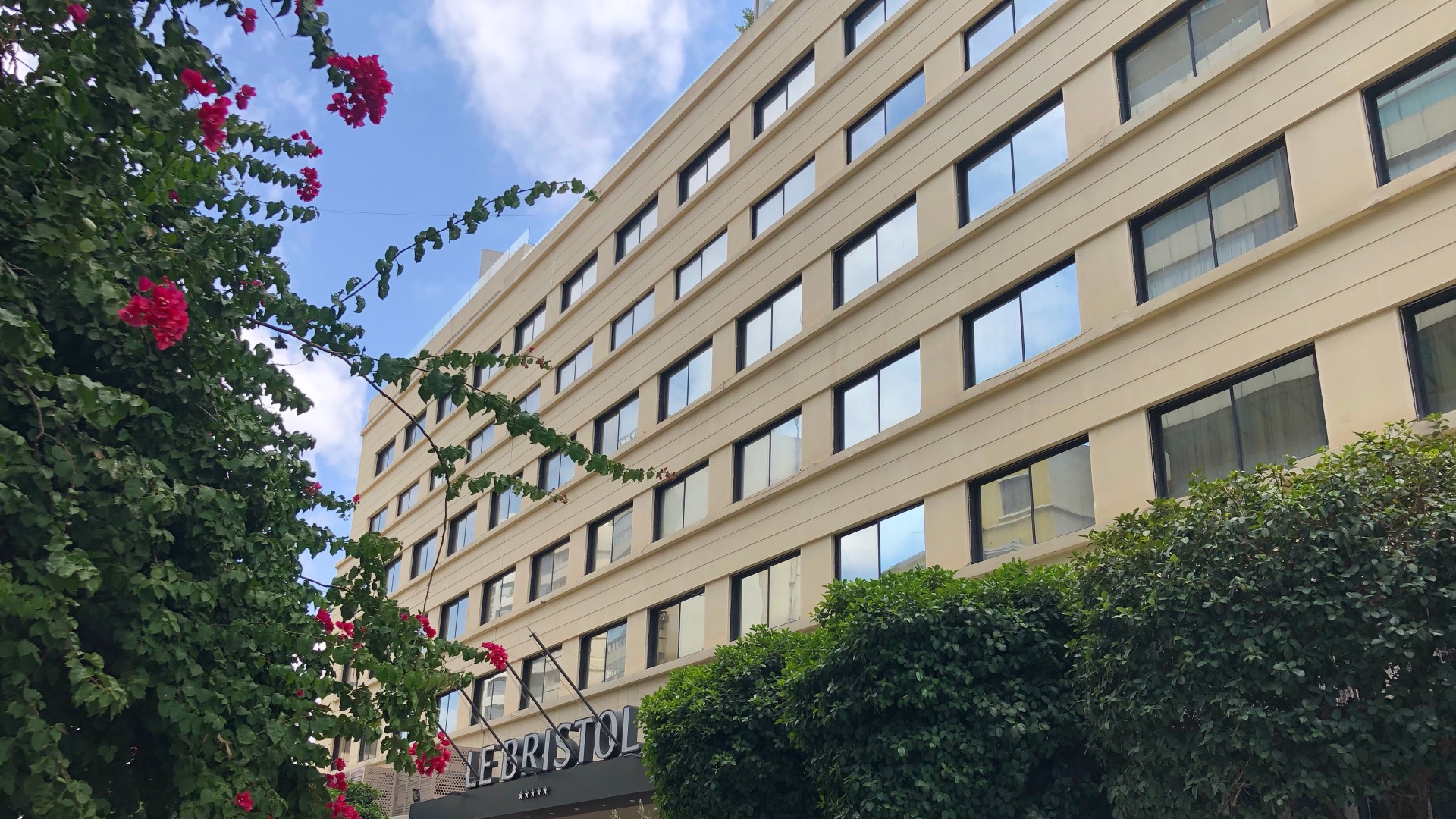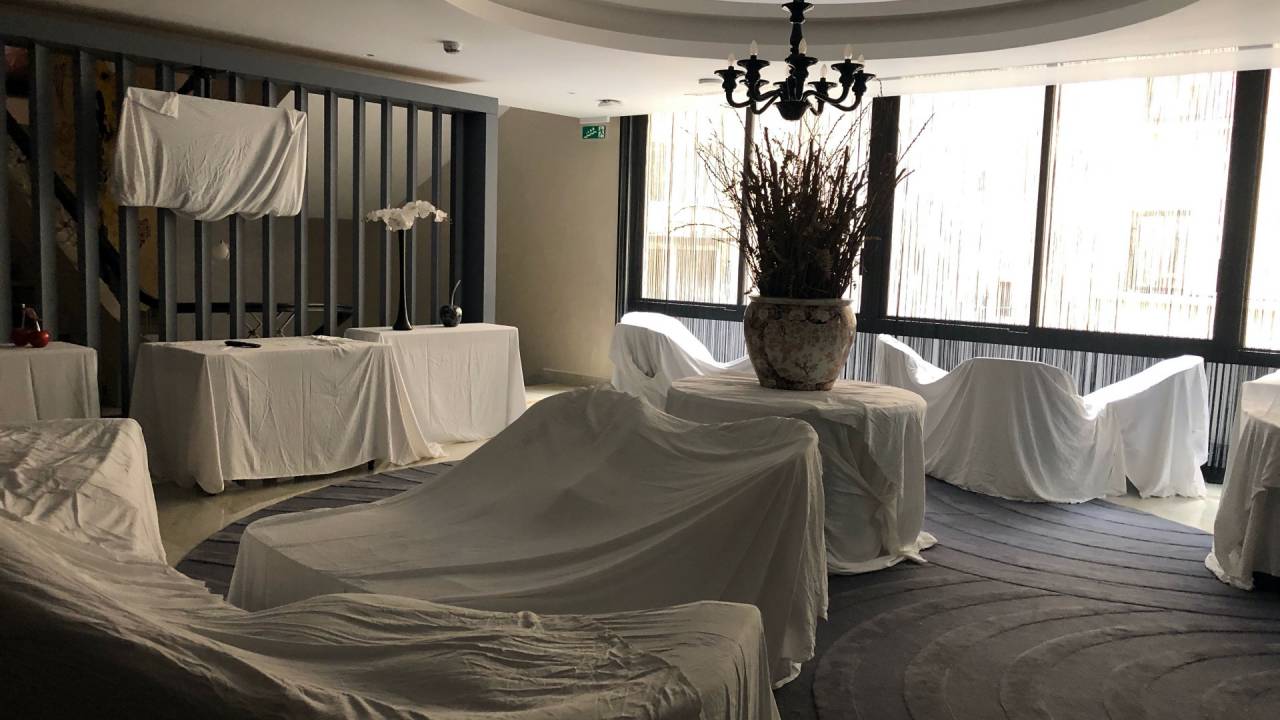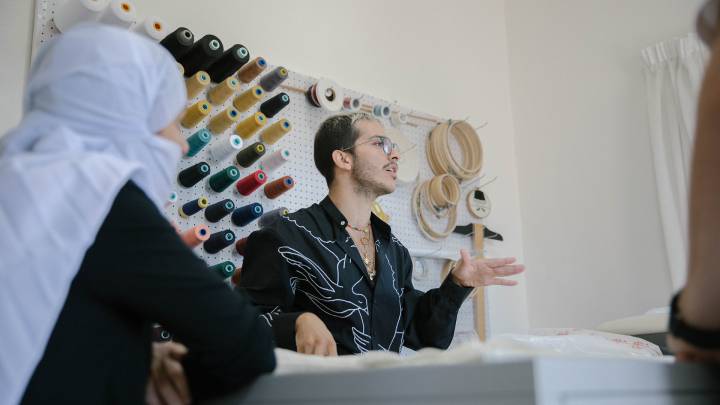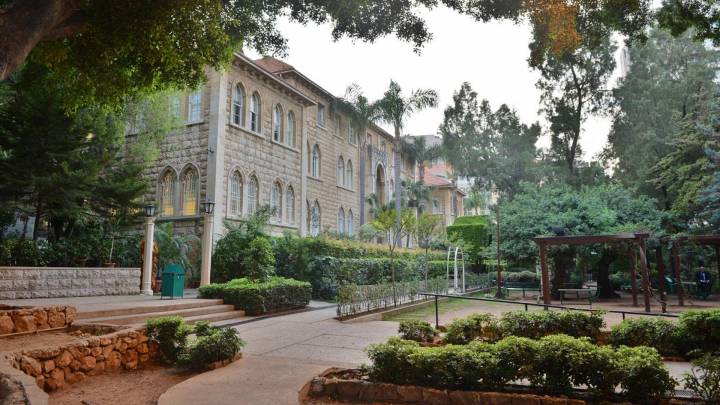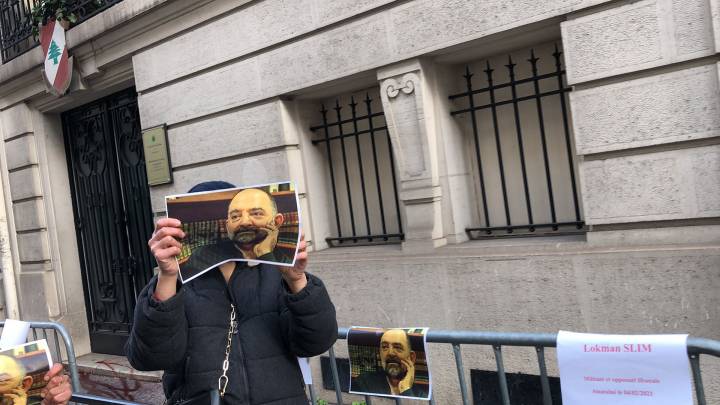Beirut’s legendary Le Bristol Hotel survived wars, occupation and political crises - then this year’s financial crisis struck. The Grand Hotel’s closure trains the spotlight on a tourism sector teetering on the brink of extinction.
On the corner where Madame Curie Street meets Alfred Nobel Street in Beirut’s Hamra neighbourhood stands Le Bristol Hotel. What was once a monument of the city’s glamour, today embodies the Lebanese capital’s accelerating demise. For many though, Le Bristol still evokes the so-called “golden years of Lebanon.” Over its nearly 70 years of business, it has welcomed numerous members of the glitterati, including the likes of the late Shah of Iran, Princess Dina bint Abdul-Hamid of Jordan, and Prince Albert II of Monaco.
When war broke out in 1975, the hotel’s doors remained open as the world’s foreign correspondents checked in to cover the bloody conflict. Last April, however, those doors were seemingly slammed shut for good. Apart from a 10-strong skeleton maintenance team, the sumptuous upholstery is all that is left.
“It’s tragic,” says Joseph Coubat, who has been the hotel’s general manager since 2015. “Le Bristol is one of the few hotels that remained open during the war. Throughout my 42 years in hotel business this is the first time I’ve overseen the closure of a hotel. It’s a sign of where this country is headed.”
Le Bristol is the latest in a long line of establishments to go out of business, as Lebanon sinks deeper into economic collapse. Since the beginning of the year, more than 30 hotels have been shut down. With the average occupancy rate hovering around 2-3%, many more are expected to follow suit.
It is not just hotels which have been suffering
Among the casualties are other leading lights in Lebanon’s hospitality sector, including the renowned Hôtel Alexandre, another icon that has been around since 1960 in Beirut’s Achrafieh neighborhood. Then there is Le Vendôme, a boutique contemporary which opened in 1964. While Hôtel Alexandre chose to close its doors to cut its losses, Le Vendôme, saddled with mortgage debts, was sold by its creditors to Qatari investors for $35 million, half the original asking price. And it is not just hotels which have been suffering. In the six months leading up to February this year, 758 food and drink establishments also went out of business.
Since the late 1990s the Lebanese pound has been pegged to the US dollar. This has led to sky-rocketing interest rates and massive debts as most goods were imported into the country while domestic production stalled. When new cash flow dried up in 2019, the country’s economy spiralled downwards. By July 2020, the pound had lost over 80% of its value, making daily essentials unaffordable for most Lebanese.
“Le Bristol’s closure is a symptom of the magnitude of the crisis we’re facing,” says Sybille Rizk, former editor-in-chief of the business magazine Le Commerce du Levant. “The Doumit family, who owns the hotel, is not a newcomer to the hotel business. They have studied hospitality. They know how to bend and not to break, but the current circumstances are simply overwhelming.”
Wandering down the hotel’s long quiet corridors today, Le Bristol resembles a deserted palace. A plastic tarpaulin protects the round leather couch in the centre of the lobby from dust. The reception desk is unoccupied empty except a single bottle of hand sanitiser.
Soft daylight illuminates the main hall, leaking through the glass facade of Les Gourmandises, the hotel restaurant where in the 1960s star chef and then general manager Georges Rayess dazzled diners with his gastronomic delights. Rayess was a culinary pioneer, the first Lebanese chef to publish his own cookbook, Rayess’s Art of Lebanese Cuisine.
Across the hall lies The Golden Room, Beirut’s first wedding venue. A lonely crystal chandelier hangs from its dome ceiling. Where once the elite dined and danced, carpets now lie rolled up in dark corners. Le Bristol background music is of floorboards creaking rather than a lounge pianist playing. Everything is clean, tidy, and eerily silent.
“Le Bristol isn’t just a hotel, it’s a museum,” Coubat says. Unique pieces by French interior designer Jean Royère, who created the hotel’s distinctive look in 1951, still adorn many of the hotel’s rooms sustaining Le Bristol’s reputation for style and elegance. Between 2013 and 2015, Le Bristol was then refurbished by architect Galal Mahmoud at a cost of $30 million. The Lebanese architect gave the building a 21st century gloss, while preserving its identity of nostalgia and glamour.
“Since 2015, we’ve optimised sales, revisited marketing strategies, and cut losses by 75%, yet here we are,” Coubat says. “Given where the country is heading, we decided we could either give our staff redundancy packages and staunch the bleeding or keep the hotel running, bleed out, then close anyway.” The Doumits chose the latter.
Lebanon’s economic system imposes prohibitively high costs on the tourism sector
Over a hundred employees have been laid off, not including subcontractors. Beza Hiawi, the housekeeping supervisor who still works on the maintenance team, tells zenith that she was the first to cry when management broke the news. “Then we all cried. This place is home.” Hiawi arrived in Lebanon seven years ago from Ethiopia and joined Le Bristol’s staff as a housekeeper, working her way up from there. Her future is now uncertain, especially in a country where migrant workers are deprived of basic rights and even repatriation is often beyond their means. Hiawi will be employed for this year at least, after that the chances of her finding another job are slim.
“Lebanon is currently facing several different crises at once,” adds Rizk. “We have a negative balance of payment [meaning Lebanon spends more than it earns]. We also have a currency devaluation crisis, a fiscal debt crisis, and a crisis in the financial sector.”
Even before the crash, Lebanon’s economic system imposed prohibitively high costs on the country’s tourism sector. It struggled to remain competitive, relying mainly on business tourism and the diaspora. As other productive sectors shrunk, the economy has increased its reliance on income from business travellers and the seasonal homecoming of Lebanon’s disproportionately large expatriate population. The recent political instability, combined with the Covid-19 outbreak, has curtailed what little vitality there was in the sector. During the restrictions designed to stop the spread of coronavirus, the country’s main port of entry, Rafic Hariri International Airport was closed for more than three months. All hotels were forced to remain shut for almost the same period.
“Lebanon’s tourism sector employs 200,000 people, and it’s in grave danger,” says Nagi Morkos, managing partner with Hodema Consulting Services, a firm that advises hotels and other hospitality businesses. Morkos explains what the country stands to lose: “They have built one of the few functional industries in the last 20 years, they have put Lebanon on the map. Today the tourism industry is paying a heavy price. That’s the fault of those who have been managing the country for decades.”
At the beginning of July, representatives from Lebanon's embattled tourism sector held a joint press conference at the luxurious Phoenicia Hotel, overlooking the corniche. The heads of different tourism industry syndicates speaking on behalf of hotels, travel agencies and car rental companies read a long list of demands, including tax breaks, exemptions from rent and municipality fees, reductions on some loans and grace periods on others, and a more profitable exchange rate for touristic establishments. The syndicates have given the government until 3 August to respond to their ultimatum, otherwise they predict a “Black Day of Tourism.”
“Unless our demands are met, we’ll take the ties from our necks and invade the streets,” said Pierre Achkar, the head of the Syndicate of Hotel Owners in Lebanon, in his fiery speech. “We’ll occupy the Ministry of Economy and the Ministry of Tourism. What you took from us with sweet talk can only be reclaimed by force.”
Le Bristol is no stranger to political instability. It remained operational throughout the 15 year long civil war becoming a regular hangout for politicians. In 1988 leaders in support of the Syrian forces in Lebanon convened in the hotel's basement for a meeting. Militiamen guarded hotel entrances, as leaders who supported the Christian government failed to turn up. In 2004 political leaders from both fronts met in the same conference room, this time to demand an end to Syrian occupation. The coalition became known as “The Bristol Gathering.”
“The future of Le Bristol is the future of Lebanon”
The hotels of Beirut have always been at the heart of political turmoil. In 1975 the infamous “Battle of the Hotels” turned both the Phoenicia and the adjacent Holiday Inn Hotel into battlegrounds. The bullet-ridden carcass of the latter is a towering memorial to those dark days. Just across the street, the Saint Georges Hotel looks out forlornly over the Mediterranean. The late Prime Minister Rafik Hariri denied the hotel a permit to reopen after the war. In a twist of tragic irony, Hariri, along with 21 others, were killed in a blast at the foot of the building in 2005.
During a string of assassinations of those who opposed the Syrian occupation, the Phoenicia Hotel harboured some politicians for months. Coubat was the general manager of the Phoenicia Hotel at the time. “Even back then and even during the war you could find some sort of stability. But how do you find stability now?”
Pascal Selwan Tabet, the executive assistant manager of Le Bristol, is still struggling to come to terms with the reality: “I don’t think I can get my head round the closure. Some of our employees had been with us for 30 or 40 years. That’s why Le Bristol was special.” She believes that closing the hotel was the only compassionate course of action because it meant the staff would receive compensation.
“The future of Le Bristol is the future of Lebanon,” Coubat tells zenith. “What’s the future? We don’t know. For the first time they’ve brought us to our knees. We’re being humiliated.”
Nowadays a lone security guard sits behind the hotel’s bolted gates, staring at a CCTV monitor. There is not much to see. On the street outside, where Le Bristol’s catering trucks stand idle, signs of decay are increasingly easy to come by. Traffic lights no longer work. Frequent power cuts force nearby shops to close earlier than usual. And every morning the shutters of another business fail to come up.
On 3 July, a man shot himself on Hamra street, a short walk from Le Bristol. He left behind a sign that read “I am no sinner, hunger is the sinner.” Three more such incidents were reported in the following 48 hours, for apparently similar reasons.
The loss of Beirut’s historic hotels is undoubtedly tragic. But as the economic crisis increasingly threatens the very lives and livelihoods of Lebanon’s inhabitants, their demise often passes unnoticed. The few who pause to mourn Le Bristol’s closure include its former guests, staff members, and colleagues in neighbouring hotels who fear that their beloved establishment will be next.
Jonathan Dagher is a journalist and producer at the Lebanese independent online media platform Megaphone News. In summer 2019 he participated in RSF Germany’s Berlin Scholarship Programme.
The content published on the Lebanon Chronicles channel is supported by the Konrad-Adenauer-Stiftung (KAS). The views expressed in these articles are those of the respective authors and do not necessarily reflect those of the KAS.

